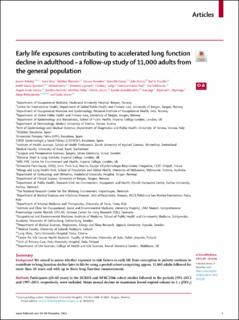Early life exposures contributing to accelerated lung function decline in adulthood – a follow-up study of 11,000 adults from the general population
Kirkeleit, Jorunn; Riise, Trond; Wielscher, Mathias; Accordini, Simone; Carsin, Anne-Elie; Dratva, Julie; Franklin, Karl A.; Garcia-Aymerich, Judith; Jarvis, Deborah; Leynaert, Benedicte; Lodge, Caroline J.; Gomez Real, Francisco; Schlünssen, Vivi; Corsico, Angelo Guido; Heinrich, Joachim; Holm, Matthias; Janson, Christer; Benediktsdóttir, Bryndís; Jogi, Rain; Dharmage, Shyamali C.; Jarvelin, Marjo-Riitta; Svanes, Cecilie
Journal article, Peer reviewed
Published version

Åpne
Permanent lenke
https://hdl.handle.net/11250/3115070Utgivelsesdato
2023Metadata
Vis full innførselSamlinger
Sammendrag
Background We aimed to assess whether exposure to risk factors in early life from conception to puberty continue to contribute to lung function decline later in life by using a pooled cohort comprising approx. 11,000 adults followed for more than 20 years and with up to three lung function measurements. Methods Participants (20–68 years) in the ECRHS and NFBC1966 cohort studies followed in the periods 1991–2013 and 1997–2013, respectively, were included. Mean annual decline in maximum forced expired volume in 1 s (FEV1) and forced vital capacity (FVC) were main outcomes. Associations between early life risk factors and change in lung function were estimated using mixed effects linear models adjusted for sex, age, FEV1, FVC and height at baseline, accounting for personal smoking. Findings Decline in lung function was accelerated in participants with mothers that smoked during pregnancy (FEV1 2.3 ml/year; 95% CI: 0.7, 3.8) (FVC 2.2 ml/year; 0.2, 4.2), with asthmatic mothers (FEV1 2.6 ml/year; 0.9, 4.4) (FEV1/FVC 0.04 per year; 0.04, 0.7) and asthmatic fathers (FVC 2.7 ml/year; 0.5, 5.0), and in women with early menarche (FVC 2.4 ml/year; 0.4, 4.4). Personal smoking of 10 pack-years contributed to a decline of 2.1 ml/year for FEV1 (1.8, 2.4) and 1.7 ml/year for FVC (1.3, 2.1). Severe respiratory infections in early childhood were associated with accelerated decline among ever-smokers. No effect-modification by personal smoking, asthma symptoms, sex or cohort was found.
